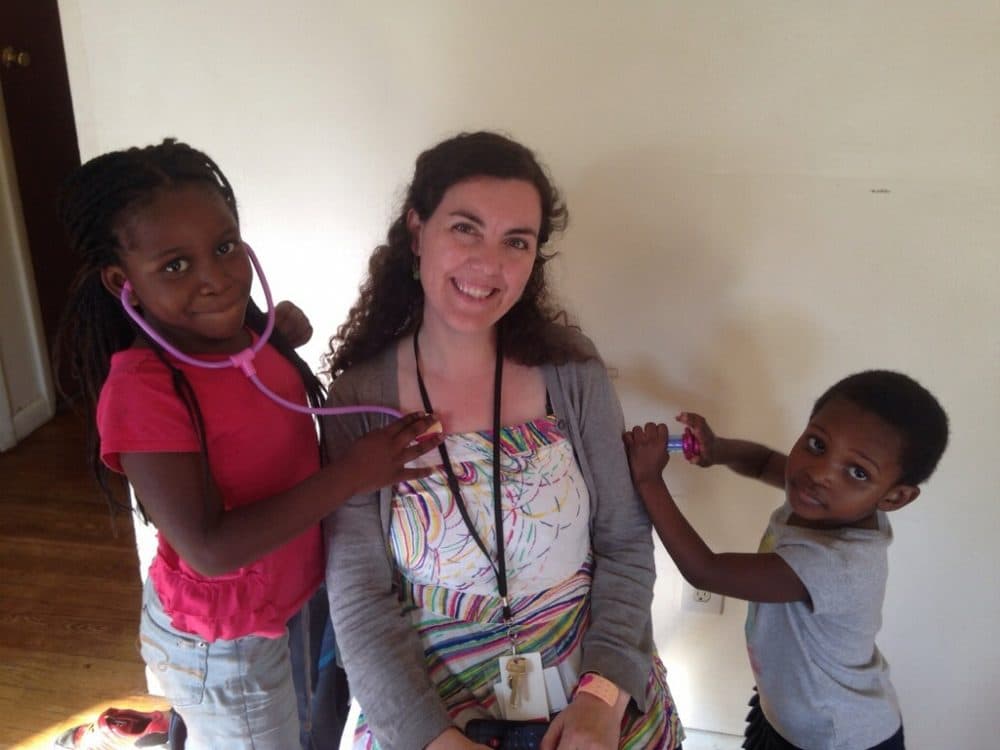Advertisement
Commentary
A Happy Ending For A Homeless Refugee Mother Of 8 Facing Cancer

Furaha’s story is shared with her permission, but her name has been changed for privacy. The name she chose, Furaha, means “joy” in Swahili.
The light from my headlamp shone down the length of the speculum, revealing Furaha’s cervix. Illuminated in the glow was a large, disfiguring mass. I held my breath for a moment while I registered the unmistakable sight of cancer. I knew how devastating this diagnosis would be to my patient. Furaha – a refugee and a single mother of eight children, all of whom were sheltered in a hotel for homeless families – already faced myriad hurdles.
Furaha fled civil war in the Democratic Republic of Congo, lived in a refugee camp where her husband abandoned the family, and finally arrived in Massachusetts. After being granted refugee status, she and her children were initially given housing but, without a job or childcare, Furaha was unable to pay the rent. Her family became homeless.
It was in the hotel where Furaha and her family were living that my Boston Health Care for the Homeless Program team and I had set up the makeshift clinic in which she was having her first pap smear, at age 39.
The Boston Health Care for the Homeless program has a “no barriers” approach to caring for our patients, despite the unconventional space and limited resources. Our philosophy is to deliver medical care wherever our patients may be: under bridges, on the street, in shelters or hospital wards.
Trauma is a constant among the men, women and children for whom we care. One study finds that rates of severe sexual and physical violence are reported to be as high as 92% in mothers experiencing homelessness. Despite not having access to standard equipment at the time, I examined Furaha and made sure that she had a pap smear as recommended – even if it was done in a hotel room clinic, using a massage table in lieu of an exam table.
Pap smears, which screen for cervical cancer, are recommended for women starting at age 21 and every three to five years thereafter. Since the screen was first introduced in the 1950s, the rate of cervical cancer deaths has dramatically declined in the U.S.
While I have had many patients with abnormal pap smears over the last few years, Furaha’s pathology report was the only one that included the unwelcome prognosis: “Malignant lesion is highly suspected.”
Rates for certain cancers are higher – and deadlier – in homeless individuals. In 2015, the American Journal of Preventative Medicine published a study demonstrating that women experiencing homelessness in Massachusetts have a rate of cervical cancer diagnosis that is 4.4 times higher than the general population, and a rate of death from cervical cancer that is six times higher. Given that homeless women are much more likely to die of this potentially preventable cancer, screening for cervical cancer is an urgent priority for our patients.
The distance of the hotel shelter from Boston’s cancer centers was one of many logistical barriers Furaha faced in her treatment plan, which included six weeks of daily radiation and weekly chemotherapy. Bus service was infrequent and some of the treatments were scheduled for times when public transportation was unavailable. Travel time could be as long as 1.5 hours each way.
Childcare was also a challenge, as Furaha did not qualify for a subsidized childcare voucher because she was unemployed. Ultimately, the cancer center generously allowed her children to use its employee-only childcare during her treatments.
Our team provided Furaha taxi vouchers so that she would not miss any appointments. Intense care coordination between our team and the cancer center was imperative for tracking Furaha’s progress and ongoing needs.
Against all odds, Furaha completed those onerous six weeks of treatment. She is now free of any evidence of cancer, although she remains under very close surveillance by her oncologists. Her family is no longer homeless, thanks to her perseverance and the support of state rehousing programs. Furaha’s family continues to live in poverty, but they are housed and safe and her children still have a loving mother to care for them.
Furaha’s story has a happy ending, which is not the case with many of our patients. Health care as a fundamental right is increasingly questioned, but Furaha’s survivorship demonstrates the need to invest in an acute medical need and the resulting benefit to society: keeping families together, ensuring their sustainable housing, and fostering a healthier population overall.
This no-barriers approach to medical care should be a universal one, but it is most vital to our marginalized members of society. Every single life is worth this investment.
Dr. Aura Obando is an internist and pediatrician with Boston Health Care for the Homeless and an Instructor of Medicine at Harvard Medical School. She tweets @AObandoMD.